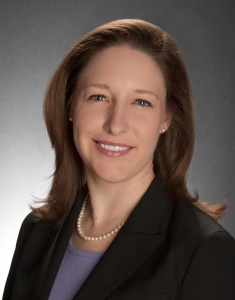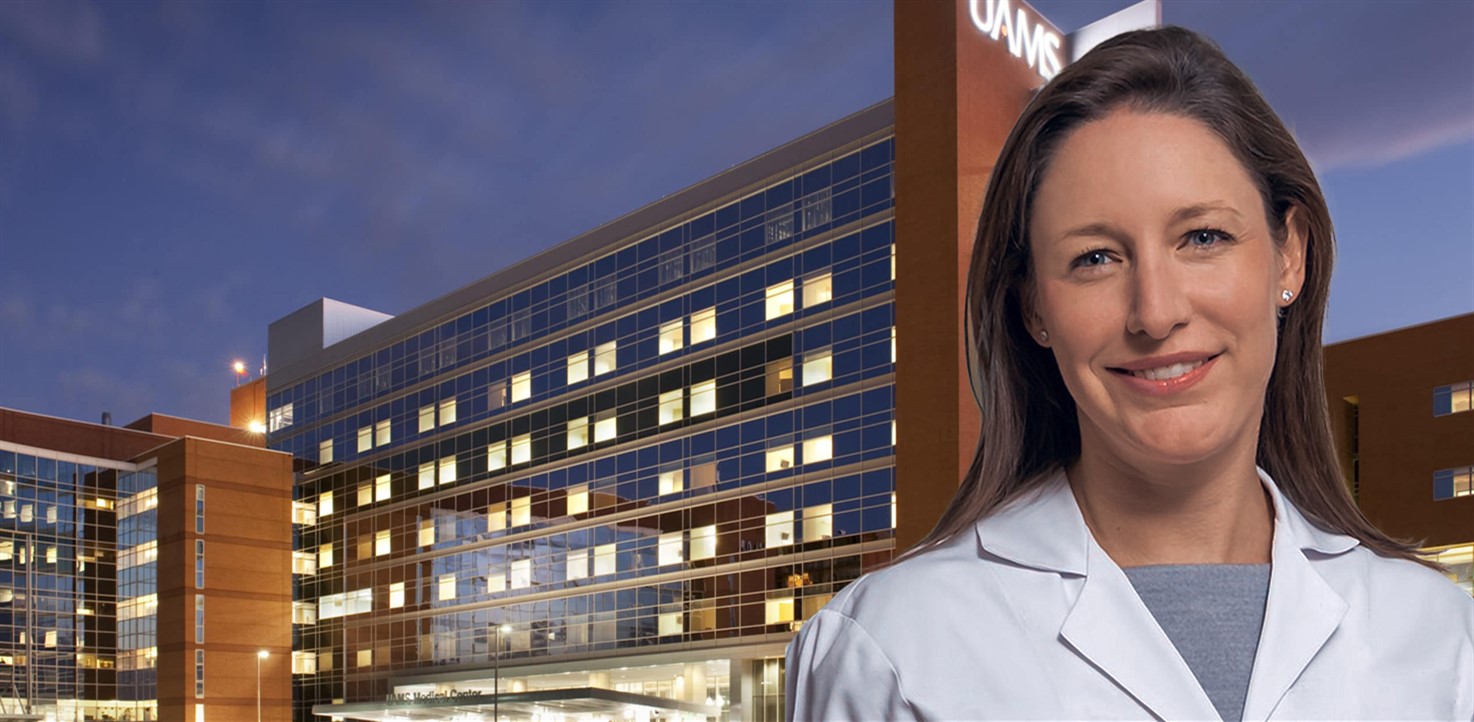 Susan D. Emmett, M.D., MPH, an otolaryngologist and public health-trained researcher who holds four grants from the National Institutes of Health, has joined the University of Arkansas for Medical Sciences (UAMS), where she will lead the new Center for Hearing Health Equity.
Susan D. Emmett, M.D., MPH, an otolaryngologist and public health-trained researcher who holds four grants from the National Institutes of Health, has joined the University of Arkansas for Medical Sciences (UAMS), where she will lead the new Center for Hearing Health Equity.
Emmett is an associate professor in the UAMS College of Medicine Department of Otolaryngology-Head and Neck Surgery, where the center is being established, and has a secondary appointment in the Fay W. Boozman College of Public Health.
“Dr. Emmett is a star in our field, with a national and international reputation,” said John Dornhoffer, M.D., chair of the department. “As one of the most successful NIH-funded ENT surgeons in the country, she will help UAMS quickly become a leader in research involving hearing health disparities both in Arkansas and abroad. I am extremely excited to have been able to recruit a physician scientist of her caliber.”
“The College of Public Health is extremely pleased that Dr. Emmett will be joining the Department of Epidemiology,” said Dean Mark L. Williams, Ph.D. “Hearing loss is an understudied aspect of obesity, diabetes and high blood pressure. Dr. Emmett’s research will help us understand and ultimately prevent and treat hearing loss.”
While part of Emmett’s time is spent seeing patients and performing cochlear implant surgery, her primary focus is on research into hearing loss disparities, in an effort to improve access to care for people, particularly children, in underserved areas. The research aims to identify those who are at risk of developing hearing loss or are already experiencing it but haven’t been diagnosed, and help them easily access affordable preventive care and treatment.
Worldwide, 1.5 billion people are believed to have some degree of hearing loss, and 60% of hearing loss in children is preventable according to the World Health Organization.
“Childhood hearing loss has a lifelong impact,” she said, citing effects on speech and language development, the ability to learn in school, and later obtain a job. “But it could be prevented if we identify the problem early and make sure children have access to the care that they need. To tackle this problem takes thinking about this from several different perspectives.”
That’s where the Center for Hearing Health Equity comes in. The center is the only center of its kind in the world and will be home to research conducted by two multi-center networks, both run by Emmett. The Global HEAR (Global Hearing Loss Evaluation, Advocacy & Research) Collaborative is an international research network that includes a multidisciplinary group of investigators from 28 countries, and HEAR USA has six sites as the United States HEAR Collaborative branch. Both collaboratives are dedicated to reducing disparities in hearing loss across the country and worldwide.
Emmett is moving her four NIH grants to UAMS from the Duke University School of Medicine, where she earned her medical degree in 2010 and was most recently an associate professor of surgery and global health. Three of these grants are HEAR Collaborative endeavors, including two randomized trials that together involve more than 20,000 children in about 100 schools in Appalachia in Kentucky and in rural Alaska.
In the third HEAR Collaborative grant, Emmett is partnering with industry and academic partners in South Africa company to develop an inexpensive, portable tool to check for middle ear infections that are often a precursor to hearing loss. This cell phone-based screening device can be used by teachers or community health workers to screen children in schools instead of relying on audiologists with advanced degrees — a scarce resource in rural and underserved areas.
“There is no standardized method across the country to screen children for hearing loss,” she said, and even once rural children with hearing loss are identified, they often never receive the care that they need. “Our plan is to change that, and completely alter the paradigm for detecting hearing loss early and ensuring access to treatment. My goal is to eventually eliminate preventable childhood hearing loss through early detection and effective intervention.”
UAMS is the state’s only health sciences university, with colleges of Medicine, Nursing, Pharmacy, Health Professions and Public Health; a graduate school; a hospital; a main campus in Little Rock; a Northwest Arkansas regional campus in Fayetteville; a statewide network of regional campuses; and seven institutes: the Winthrop P. Rockefeller Cancer Institute, Jackson T. Stephens Spine & Neurosciences Institute, Harvey & Bernice Jones Eye Institute, Psychiatric Research Institute, Donald W. Reynolds Institute on Aging, Translational Research Institute and Institute for Digital Health & Innovation. UAMS includes UAMS Health, a statewide health system that encompasses all of UAMS’ clinical enterprise. UAMS is the only adult Level 1 trauma center in the state. U.S. News & World Report recognized UAMS Medical Center as a Best Hospital for 2021-22; ranked its ear, nose and throat program among the top 50 nationwide for the third year; and named five areas as high performing — colon cancer surgery, diabetes, hip replacement, knee replacement and stroke. UAMS has 3,047 students, 873 medical residents and fellows, and six dental residents. It is the state’s largest public employer with more than 11,000 employees, including 1,200 physicians who provide care to patients at UAMS, its regional campuses, Arkansas Children’s, the VA Medical Center and Baptist Health.
About University of Arkansas for Medical Sciences:
“The University of Arkansas for Medical Sciences (UAMS) in Little Rock is the only health sciences university in the state of Arkansas. We are the state’s largest public employer with more than 10,000 employees in 73 of Arkansas’ 75 counties. UAMS and its clinical affiliates, Arkansas Children’s Hospital and the VA Medical Center, are an economic engine for the state with an annual economic impact of $3.92 billion.
UAMS offers 73 baccalaureate, master’s, doctoral, professional and specialist degree programs and certificates through our Colleges of Medicine, Nursing, Pharmacy, Health Professions, Public Health and graduate school. Students attend classes at the UAMS main campus in Little Rock and our regional campus in northwest Arkansas.
With our combination of education, research and clinical programs, UAMS has a unique capacity to lead health care improvement in the state.”
About Susan D. Emmett, M.D., MPH:
“My research focuses on reducing hearing health disparities globally. I work with colleagues around the world to define the global burden of hearing loss and deepen our understanding of its social, economic, and health impact. We apply a public health approach that spans prevention, diagnosis, and treatment.
Fundamental to prevention is evaluating why hearing loss is so much more common in low-resource settings and investigating risk factors that are potentially modifiable. I have focused my prevention efforts on undernutrition, evaluating the contribution of early life malnutrition and micronutrient deficiencies to risk of hearing loss in Nepal. We are currently expanding this work to the Bolivian Amazon.
Diagnosis of hearing loss in remote settings brings unique challenges, including scarcity of audiologists and otolaryngologists, need for portable equipment, and lack of screening programs to identify affected children. I am currently leading a PCORI (Patient-Centered Outcomes Research Institute)-funded community randomized trial with the Norton Sound Health Corporation in Nome, Alaska to evaluate a new protocol for school hearing screening in 15 villages on the Bering Sea. This study utilizes mobile health technology and telemedicine referral to identify previously undiagnosed hearing loss and efficiently connect Alaska Native children to care. The intervention has applicability across the state of Alaska, as well as in other remote, low-resource settings with a high prevalence of hearing loss and ear disease.
My research on treatment of hearing loss is focused on expanding access to cochlear implantation, a treatment for severe-to-profound hearing loss traditionally limited to high-resource settings. I have worked with collaborators in 14 countries to demonstrate that cochlear implantation can be a cost-effective treatment option in Sub-Saharan Africa and Latin America. We are expanding these studies to other regions of the world. “
Sources:
News: https://news.uams.edu/2022/06/15/otolaryngologist-susan-d-emmett-m-d-mph-to-direct-new-uams-center-for-hearing-health-equity/
UAMS: https://web.uams.edu/about/
Susan D. Emmett, M.D., MPH: https://headnecksurgery.duke.edu/faculty/susan-d-emmett-md-mph




